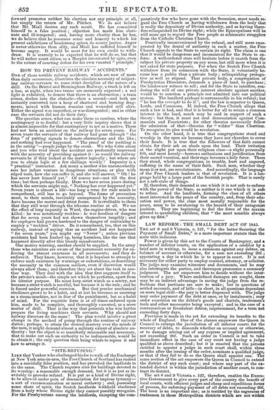HOW TO PREVENT RAILWAY "ACCIDENTS." ONE of those terrible railway
accidents, which are now of more than daily occurrence, illustrates the absolute necessity of subject- ing railway-servants to some strict discipline of the nature of a drill. On the Bristol and Birmingham Railway, a truck is left on a line, at night, when two trains are momently expected ; a red light is exhibited, to denote that there is an obstruction ; a train comes, dashes into the obstacleāthen a secondāand both are instantly converted into a heap of shattered and burning frag- ments, mixed with human remains and wounded still alive. Either the signal was imperfect, or was disregarded ; and in either case the servants did not do their duty.
The question arises, what can make them so careless, where the contingency is so fearful : but a very little inquiry shows that it is almost impossible for that contingency to act as a motive. There had not been an accident on the railway for seven years. For seven years the servants of that railway had gone through "the form" of putting signals to denote obstructions and the like ; and nothing had ever happened. "The proof of the pudding is in the eating "āpeople judge by the event. We who write about and you who read about the accident are profoundly impressed with the necessity of providing against it : so would the railway servants be if they looked at the matter logically ; but where are you to obtain logic at a few shillings weekly ? Impunity is a "practical" instructor. Ask many a mother who unconcernedly sees her infant venture in dangerous situations, or play with edged tools, how she can suffer it, and she will answer, " Oh ! he has never hurt himself yet." Of course notānot till the first time; but then perhaps fatally. Here we have seven years during which the servants might say, "Nothing has ever happened yet." Seven years is almost a lifeātoo long a term for rude minds to comprehend, still less to go beyond. The forms of precaution must, to their minds, inevitably unimpressed by the necessity, have become the merest and driest forms. It is creditable to them that they still went through the irksome routine at all. We see the effect of long impunity in Ward, the engine-driver, who was killed : he was notoriously reckless : he was heedless of dangers that for seven years had not shown themselves tangibly ; and his employers had grown hardened to the danger of continuing to employ a " reckless " driver. Be it remembered, too, that on this railway, instead of saying that an accident had not happened "for seven years," you might say "Never" ; unless previous accidents had been hushed up, being harmless, like the one that happened directly after this bloody misadventure. One motive wanting, another should be supplied. In the army those who calculate are aware of the paramount necessity for en- forcing the utmost exactness in all movements; and they do enforce it. They know, however, that it is hopeless to attempt to enforce such exactness by warnings or exhortations, or describing the necessity to the common soldiers, even if discretion would always allow them ; and therefore they set about the task in ano- ther way. They deal with the idea that first suggests itself to the private's mindāthe simple act which he performs, apart from its ulterior purpose. He must keep strict watch as a sentry, not because a strict watch is needful, but because it is the rule ; and he is forced under powerful coercion. But that precise mechanical obedience grows to be a habit, and at last he becomes as unerring as a steam-machine, not in fear of the punishment, but as a habit of mind. For the requisite form is at all times enforced upon him, made to be complete, and thoroughly executed, as a mere matter of drill. That is the way that generals who win battles prepare the living machines their servants. Why should not railway directors do the same? The plan would involve a great change in the method of going through the routine of railway duties ; perhaps, to attain the desired mastery over the minds of the men, it might demand almost a military extent of absolute au- thority: but the object is so manifestly reasonable and necessary, that to make out such an authority to be indispensible, would be to obtain it ; the only question then being where to repose it and how to arrange it.


























 Previous page
Previous page